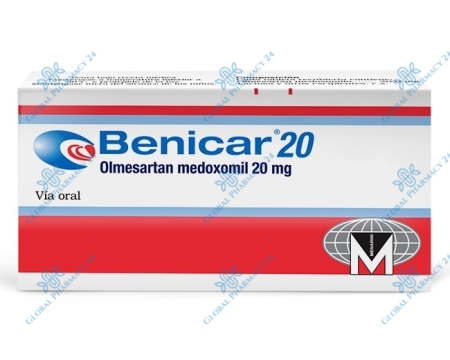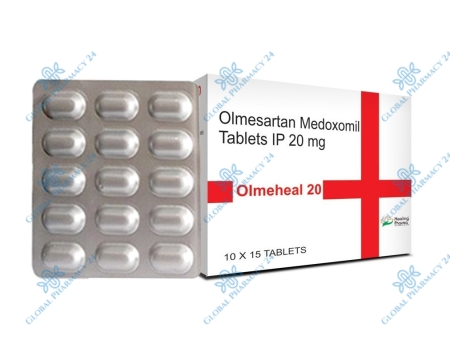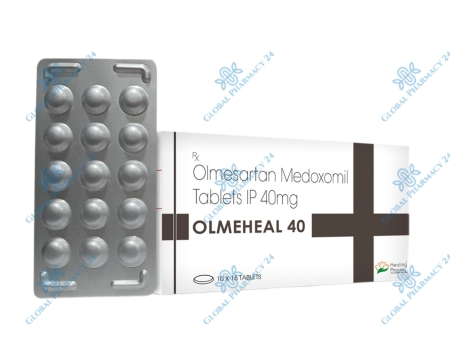| Aspect | Detail |
|---|---|
| Active Ingredient | Olmesartan Medoxomil |
| Dosage Forms | Tablets (5 mg, 20 mg, 40 mg) |
| Indication | Hypertension |
| Duration of Effect | 24 hours |
| Regulatory Status | FDA approved |
The Medicinal Marvel: Benicar (Olmesartan)
Benicar, known generically as Olmesartan Medoxomil, stands as a cornerstone in the management of hypertension. This medication, through its precise action on the renin-angiotensin system, offers a significant reduction in blood pressure levels, thereby mitigating the risk of cardiovascular events. The therapeutic efficacy of Benicar, backed by extensive clinical research, ensures sustained blood pressure control over a 24-hour period, promoting better patient compliance and cardiovascular outcomes.
Its role in medicine extends beyond mere blood pressure reduction; Benicar has shown to have renal protective effects in patients with type 2 diabetes, illustrating its multifaceted benefits in a broader spectrum of cardiovascular health. This distinctive advantage underscores Benicar's importance in a comprehensive hypertension management strategy, aligning with healthcare providers' goals of achieving optimal patient health through targeted therapy.
Its Role in Medicine
Olmesartan's critical role in the medical field is underscored by its capacity to effectively manage hypertension, a major risk factor for cardiovascular diseases. Its unique mechanism of action allows for targeted blockade of the angiotensin II receptor, which is pivotal in blood pressure regulation. This specificity not only results in superior blood pressure control but also minimizes the risk of adverse effects, making Benicar a preferred choice for many healthcare professionals and patients alike.
Navigating Through Market Options
In a market saturated with antihypertensive medications, Benicar distinguishes itself through its efficacy, safety profile, and patient tolerability. When compared to other options, such as ACE inhibitors or calcium channel blockers, Benicar offers a compelling choice for patients seeking effective and long-lasting blood pressure control without the burden of frequent dosing or undesirable side effects.
The Science Behind Benicar's Action
Benicar operates by selectively inhibiting the binding of angiotensin II to the AT1 receptor, which is found in many tissues including vascular smooth muscle and the adrenal gland. This inhibition prevents the vasoconstrictive and aldosterone-secreting effects of angiotensin II, leading to decreased blood pressure. The precision of this mechanism allows for targeted intervention without affecting other pathways, which can lead to side effects.
The efficacy of Benicar in lowering blood pressure has been demonstrated in numerous studies, showcasing its superiority over placebo and its competitive edge in comparison with other antihypertensive agents. Its ability to significantly reduce systolic and diastolic blood pressure positions it as a valuable tool in the management of hypertension, especially in patients who have not achieved target blood pressure levels with other therapies.
Interaction with the Human Body
Upon administration, Olmesartan exerts its therapeutic effect by selectively blocking the angiotensin II receptor in vascular smooth muscle, leading to vasodilation and subsequent reduction in blood pressure. This specific action minimizes interference with other bodily systems, reducing the likelihood of adverse effects commonly seen with other hypertensive medications.
A Comparative Study with Other Hypertensive Drugs
Comparative studies have highlighted Benicar's advantages over other antihypertensive drugs, particularly in terms of efficacy, onset of action, and safety profile. Patients treated with Olmesartan often report fewer side effects and better overall satisfaction, which is attributed to its specific receptor blockade and the consequent reduction in blood pressure without significant alterations in electrolyte balance or metabolism.
The Correct Way to Consume Benicar
For optimal results, Benicar should be consumed exactly as prescribed by a healthcare provider. It is generally taken once daily, with or without food, and at the same time each day to maintain a consistent level of medication in the body. Adjustments in dosage may be required based on the patient's response to treatment, underlying health conditions, and concurrent medications to ensure the best possible outcome while minimizing the risk of side effects.
Patients are advised to maintain a proper diet, engage in regular physical activity, and monitor their blood pressure regularly alongside Benicar therapy. These lifestyle modifications can enhance the effectiveness of the medication and contribute to the overall management of hypertension, leading to improved health and quality of life.
Recommended Dosage and Overdose Measures
The standard starting dose of Benicar for most patients is 20 mg once daily, with the potential to increase to 40 mg for optimal blood pressure control. In cases of overdose, immediate medical attention is crucial. Symptoms of overdose may include severe hypotension and dizziness, necessitating supportive measures to stabilize blood pressure and prevent complications.
Instructions for Missed Doses
In the event of a missed dose, the patient should take the medication as soon as they remember, unless it is almost time for their next dose. In such cases, skip the missed dose to avoid doubling up. Consistency in medication intake is key to maintaining effective blood pressure control.
Understanding the Complexities of Personal Import
The importation of Benicar for personal use involves navigating a complex landscape of regulatory requirements and legal considerations. While the FDA allows certain medications to be imported under specific circumstances, it is imperative for individuals to understand these regulations to ensure compliance and guarantee the integrity of the medication being imported.
A Guide for Secure and Legal Import
To navigate the process of importing Benicar securely and legally, individuals should prioritize purchasing from reputable sources, ensure they have a valid prescription, and verify the authenticity and safety of the medication. Engaging with licensed pharmacies and adhering to customs and FDA guidelines are essential steps in safeguarding health while accessing necessary treatments.
Deciphering Global Import Rules
Understanding the global landscape of medication import rules is vital for patients seeking to import Benicar. Regulations can vary significantly from one country to another, with some requiring specific documentation and others imposing restrictions on the types and quantities of medications that can be legally imported. Research and due diligence are paramount in complying with these international norms.
An In-Depth View of Contraindications and Side Effects
While Benicar is an effective medication for hypertension, it is not suitable for everyone. Contraindications include hypersensitivity to olmesartan or any component of the formulation, and it should not be used during pregnancy due to the risk of harm to the fetus. Renal impairment and concurrent use of aliskiren in patients with diabetes are also factors that necessitate caution.
Side effects, although uncommon, can occur and range from mild to severe. Common adverse reactions include dizziness, headache, and gastrointestinal symptoms. More serious side effects may include renal dysfunction and hyperkalemia. Monitoring by healthcare professionals is essential to manage these risks and adjust treatment as necessary.
Identifying Who Should Avoid Benicar
Patients with a history of angioedema, severe renal impairment, or those who are pregnant should avoid using Benicar. It is also advised that individuals with a history of hypersensitivity reactions to any angiotensin receptor blocker (ARB) exercise caution when considering Benicar as a treatment option.
A Look at Potential Side Effects and Their Management
Potential side effects of Benicar can often be managed through dose adjustment, lifestyle changes, or the addition of supplementary treatments. Healthcare providers play a crucial role in monitoring for adverse effects and implementing appropriate interventions to mitigate them, ensuring patient safety and treatment efficacy.
A Detailed Assessment of Benicar's Benefits and Drawbacks
- Benefits:
- Effective reduction of high blood pressure
- Once-daily dosing for improved compliance
- Renal protective effects in patients with diabetes
- Low incidence of adverse effects compared to other antihypertensives
- Drawbacks:
- Not suitable for use during pregnancy
- Potential for severe side effects, although rare
- May require careful monitoring in patients with renal impairment
Concluding the Benicar Journey: Final Reflections
Benicar (Olmesartan) has proven to be a valuable medication in the management of hypertension, offering patients a reliable option for controlling blood pressure and reducing the risk of cardiovascular events. Its specific mechanism of action and favorable safety profile make it a preferred choice for many, though individual responses and potential side effects necessitate personalized care and monitoring.
The journey of managing hypertension with Benicar underscores the importance of a comprehensive approach, incorporating medication, lifestyle modifications, and regular monitoring. By understanding the intricacies of Benicar's use, patients and healthcare providers can work together to achieve optimal health outcomes and enhance the quality of life for those affected by hypertension.
FAQs Benicar
1. What is Benicar used for?
Benicar is a medication used to treat high blood pressure (hypertension) in adults and children who are at least 6 years old. It belongs to a class of drugs known as angiotensin II receptor blockers (ARBs), which help to relax blood vessels, thus lowering blood pressure.
2. How should I take Benicar?
Benicar should be taken exactly as prescribed by your doctor. Typically, it is taken once daily, with or without food. Follow the instructions provided on your prescription label and do not alter your dose without consulting your doctor.
3. What are the possible side effects of Benicar?
Common side effects of Benicar may include dizziness, headache, nausea, diarrhea, and back pain. In some cases, it may cause more serious side effects such as kidney problems or allergic reactions. If you experience any severe side effects, seek medical attention immediately.
4. Can I take Benicar if I am pregnant?
No, Benicar should not be taken during pregnancy. It can cause injury or death to the unborn baby if taken during the second or third trimester. If you become pregnant while taking Benicar, inform your doctor immediately. It is important to discuss alternative medications with your healthcare provider.





















